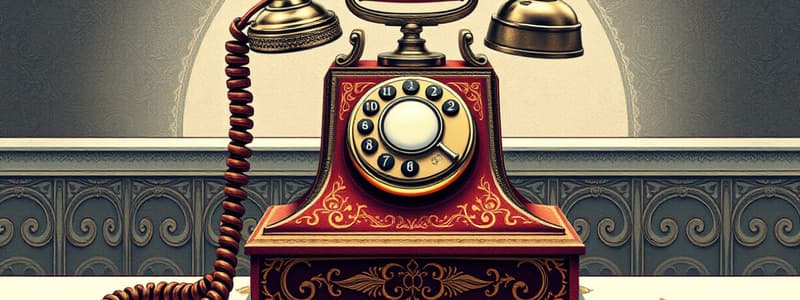Podcast
Questions and Answers
What does telephone etiquette include?
What does telephone etiquette include?
Your voice, some basic telephone manners, speaking on the level of the caller, controlling the conversation, and making the proper verbal responses.
What are some important points of handling phone calls in a business office setting?
What are some important points of handling phone calls in a business office setting?
Some important points include being polite, taking messages accurately, and connecting calls promptly.
What should you find out as soon as possible when controlling a conversation on the phone?
What should you find out as soon as possible when controlling a conversation on the phone?
Find out what the question or problem is.
What should you do after answering all the questions during a phone call?
What should you do after answering all the questions during a phone call?
The caller knows whether you are the janitor or the CEO when you answer the phone.
The caller knows whether you are the janitor or the CEO when you answer the phone.
What are the five ways a customer evaluates you?
What are the five ways a customer evaluates you?
Match the following elements of the communication process:
Match the following elements of the communication process:
What should you be cautious about in sub-verbal communication?
What should you be cautious about in sub-verbal communication?
What are the three elements of an effective greeting?
What are the three elements of an effective greeting?
Industry standards suggest answering the phone on the first ring.
Industry standards suggest answering the phone on the first ring.
When handling non-emergency calls, what should you do?
When handling non-emergency calls, what should you do?
What should automated answering systems do?
What should automated answering systems do?
Flashcards are hidden until you start studying
Study Notes
Telephone Etiquette Overview
- Effective telephone etiquette involves clear voice modulation, basic manners, adjusting communication style, steering the conversation, and responding appropriately.
Handling Phone Calls in Office Settings
- Important practices include addressing calls promptly and ensuring professionalism throughout the dialogue.
Controlling the Conversation
- Quickly identify the caller's issue without guessing; request specific details such as member ID numbers and dates of claims.
- Keep the conversation focused on the caller’s questions and avoid unrelated topics.
Additional Conversation Control Techniques
- Provide thorough answers and confirm the caller’s understanding.
- Politely wrap up the call after addressing all inquiries and inquire if further assistance is needed.
- Maintain composure; never terminate the call in a rude manner.
Representing the Company
- The tone and demeanor during a call reflect the entire company, regardless of your position.
- Customers judge you based on reliability, responsiveness, assurance, empathy, and the tangible appearance.
Customer Evaluation Factors
- Reliability: Meeting promised expectations.
- Responsiveness: Ability to assist promptly.
- Assurance: Displaying knowledge and courtesy.
- Empathy: Demonstrating care for the customer.
- Tangibles: The physical appearance of facilities and yourself.
Communication Process Elements
- The six key components include the sender, channel, receiver, feedback, physical environment, and psychological environment, all influencing effective exchange.
Importance of Sub-Verbal Communication
- Knowing your caller’s name and being cautious with verbal cues is vital to avoid misunderstandings.
- Non-verbal sounds (e.g. “uh huh”, “yeah”) can impact caller engagement and interest.
Elements of an Effective Greeting
- An effective greeting consists of a friendly greeting, self-identification, and an offer of assistance.
Phone Answering Standards
- Industry standard suggests answering by the third ring, although setting a standard for consistent behavior is crucial. Voice messaging systems should align with this standard.
Handling Non-Emergency Calls
- Quickly gather relevant information about the caller’s concern and ensure the caller can hold if necessary. Schedule follow-up calls if required.
Answering Calls in Medical Offices
- Automated systems should answer by the third ring and guide callers appropriately, emphasizing the importance of calling emergency services when necessary. Proper training and a call screening manual are essential for effective call handling.
Studying That Suits You
Use AI to generate personalized quizzes and flashcards to suit your learning preferences.




